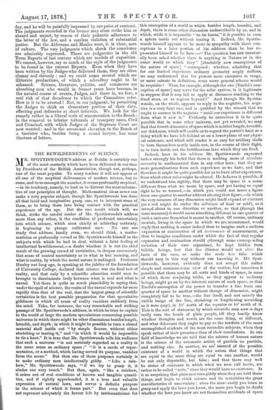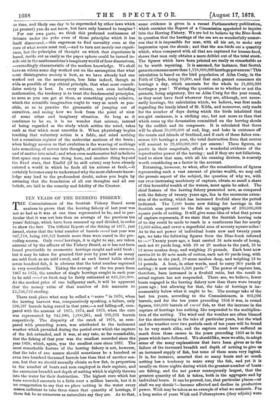THE BEWILDERMENTS OF SCIENCE.
AA-R. SPOTTISWOODE'S address at Dublin is certainly one of the most masterly which have been delivered in our time by Presidents of the British Asssociation, though not, perhaps, one of the most popular. To many readers it will not appear at all one of the sceptical deliverances of modern science, but to some, and to us amongst the number, it seems profoundly sceptical, —in its tendency,.namely, to lead us to distrust the most substan- tive of our principles of thought. Mathematical ideas never can make a very popular subject, though Mr. Spottiswoode has done all that lucid and imaginative grasp can, so to interpret some of them, as to bring them into living contact with the practical experience of the age. But the one result which will, we think, strike the careful reader of Mr. Spottiswoode's address more than any other, is the condition of profound uncertainty into which science, which aims chiefly at achieving certainty, is beginning to plunge cultivated men. No one can study that address, hardly even, we should think, a mathe- matician as profoundly versed as Mr. Spottiswoode himself in the subjects with which be bad to deal, without a faint feeling of intellectual bewilderment,—a doubt whether it is not the chief result of the growing crowd of certainties, to deepen enormously that sense of central uncertainty as to what is but seeming, and what is reality, by which the moral nature is unhinged. Professor Huxley not long ago, in speaking at the jubilee of the foundation of University College, declared that science was the final test of reality, and that only by a scientific education could men be brought to discriminate truly between what is real and what is unreal. Yet there is quite as much plausibility in saying that, under the spell of science, the realm of the unreal expands far more rapidly than that of the real, that the largest grasp of scientific certainties is the best possible preparation for that speculative giddiness in which all sense of reality vanishes suddenly from the mind. Take, for instance, the very remarkable and striking passage of Mr. Spottiswoode's address, in which he tries to explain to the world at large the modern speculations concerning possible universes in which there might be other dimensions besides length, breadth, and depth; in which it might be possible to turn a closed material shell inside out "by simple flexure, without either stretching or tearing it," and "in which it would be impossible to tie a knot." It is true that Mr. Spottiswoode tells his audience that such a universe "is not seriously regarded as a reality in the same sense as ordinary space ;" "it is a mode of repre- sentation, or a method, which having served its purpose, vanishes from the scene." But then one of these purposes certainly is to make ordinary men intellectually giddy. "Like a rain- bow," Mr. Spottiswoode says, if we try to grasp it, it eludes our very touch." But then, again, "like a rainbow, it arises out of real conditions of known and tangible quanti- ties, and if rightly apprehended, it is a true and valuable expression of natural laws, and serves a definite purpose in the science of which it forms part." But even that does not represent adequately the favour felt by mathematicians for this conception of a world in which, besides length, breadth, and I depth, there is some other dimension undescribable by us, and in which, while it is impossible "to tie knots," it is possible to turn a sphere inside out without tearing it. Indeed, Mr. Spottis- woode himself appears to be more in sympathy with these con- ceptions in a later portion of his address than he has re- presented himself to be here :—" The question has not unnatur- ally been asked whether there is anything in Nature or in the outer world to which they" [absolutely new conceptions of the nature of space] " correspond ; whether, admitting that for our limited experience ordinary geometry amply suffices, we may understand that for powers more extensive in range, or more minute in definition, some more general scheme would be requisite? Thus, for example, although the one [Euclid's con- ception of space] may serve for the solar system, is it legitimate to suppose that it may fail to apply at distances reaching to the fixed stars, or to regions beyond?" And though Mr. Spottis- woode, on the whole, appears to reply in the negative, his nega- tive is a very faint one, and is qualified by the remark that we ought to answer in the negative "until our experience is different from what it now is." Evidently he conceives it to be quite possible that in some other universe, not yet revealed, we may find that fourth dimension of apace which is neither length, breadth, nor thickness, which will enable us to regard the porter's knot as a thing which we have left behind us on a lower plane of our physi- cal existence, and which will render it as easy for artillery shells to turn themselves neatly inside out, in the course of their flight, as to turn inside out the fortifications into which they are fired.
Indeed, later in his address Mr. Spottiswoode expressed rather strongly his belief that there is nothing more of absolute necessity in mathematical than in any other laws ; that they are mere generalisations from such experience as we have, and that therefore it might be quite possible for us to have other experience, from which other rules might be educed. He believes it possible, if we understand him rightly, that there may be space in a sense different from what we mean by space, and yet having an equal right to be so termed,—in which you could not move a figure from one quarter to another without altering that figure,—in which the very measure of any dimension might itself expand or contract (as a rod might do under the influence of heat or cold), as it moved about in one direction or another, so that (though the same measure) it would mean something different in one quarter of such a universe from what it meant in another. Of course, ordinary mortals, living in the space to which we are accustomed, would reply that nothing is easier indeed than to imagine such a uniform expansion or contraction of all instruments of measurement, or than to imagine conditions under which the fact of that regular expansion and contraction should (through some corresponding variation of their own organism), be kept hidden from fallible beings, but that the illusion would not alter the facts of the case, or make the scale less false which should vary in this way without our knowing it. Mr. Spot- tiswoode, however, evidently does not accept this rather simple and common-sense view of the matter, but conceives it possible that there may be all sorts and kinds of space, in some of which these conjuring tricks, as they appear to ordinary beings, might go on by the inherent nature of such space, so that Euclid's assumption of the power to transfer a line from one quarter of space to another without change of dimension, might completely fail to be true,—the line itself, and not merely the visible image of the line, shrinking or lengthening according as it were (say), in 100 north of the equator or 100 south of it. This is the sort of statement by which scientific men now-a-days really turn the heads of plain people, till they hardly know whether thoughts and words are the same thing, or different, and what deference they ought to pay to the verdicts of the most accomplished students of the most recondite subjects, when they speak rather of their premisses than of their conclusions. In one field of knowledge we are told that the science of human nature is the science of the automatic action of particle on particle, and nothing else. In another, we are assured of the possible existence of a world in which the axiom that things that are equal to the same thing are equal to one another, would be not only disputable, but false ; and that there may well be states of existence in which what we now call knots, are rather to be called " nots," since they would have no existence. 111 it so surprising that plain men turn giddy when they are told these things, and begin to think science and its certainties the great manufactories of uncertainty ; since the more easily you learn to grasp and apply the laws you know, the more you begin to doubt whether the laws you know are not themselves accidents of space
or time, and likely one day to be superseded by other laws which (at present) you do not know, but have only learned to imagine ?
For our own parts, we think this profound restlessness of Science under the yoke even of those principles which it has itself discovered,—this eagerness to find unreality even at the core of what seems most real,—and to turn not merely our experi- ence, but the principles of thought on which that experience is based, inside out as easily as the paper sphere could be turned in- side out in the mathematician's imaginary world of four dimensions, —exceedingly characteristic of the modern knowledge. We shall have an ethics some day worked out on the assumption that what most disintegrates society is best, as we have already had one worked out on the assumption, less false indeed, though as wide as possible of any ethical principle, that what most consoli- dates society is best. In every science, not even including mathematics, the tendency is to treat the fundamental principles, so soon as you can get at them, as something purely relative, which the scientific imagination ought to vary as much as pos- sible, so as to practise the gymnastic of jumping out of ourselves, and seeing how we look from the point of view of some other and imaginary situation. So long as it continues to be so, it is no wonder that science, instead of being regarded as the study which settles the mind, takes rank as that which most unsettles it. When physiology begins teaching that voluntary action is a fable, and mind nothing bat a conscious register of the molecular motions of the brain ; when biology assures us that evolution is the weaving of nothings into something, of nerves into thought, of accidents into essences, and of matter into mind ; and when even mathematics bid us believe that space may mean one thing here, and another thing beyond the fixed stars, that Euclid (if he still exists) may have already entered a world in which he finds all his axioms at fault,—it certainly becomes easy to understand why the most elaborate know- ledge may lead to the profoundest doubt, unless you begin by assuming that the foundation of all our thoughts and all our beliefs, are laid in the veracity and fidelity of the Creator.































 Previous page
Previous page